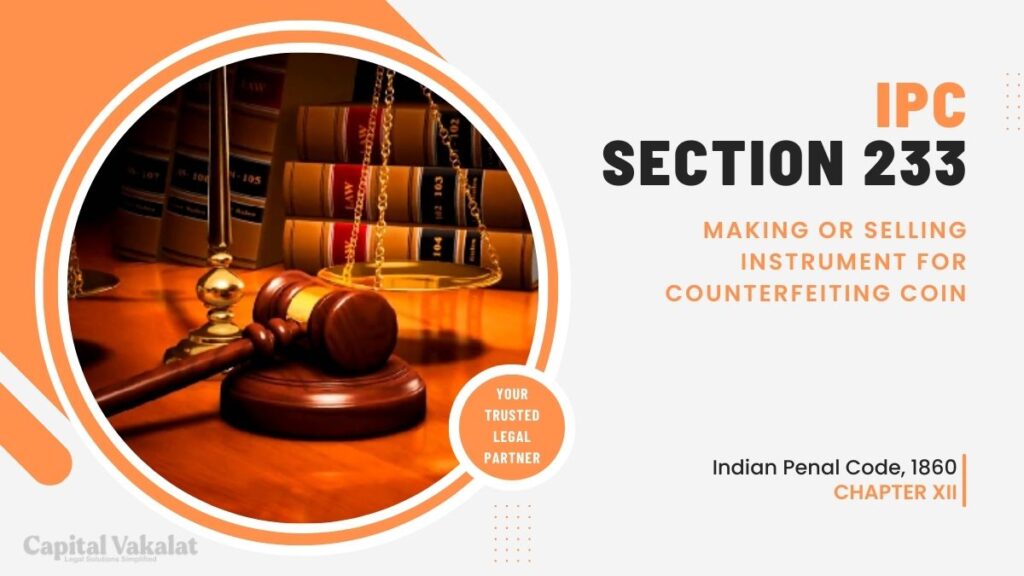Counterfeiting coins is a crime that threatens the integrity of monetary systems worldwide. In India, this unlawful act is addressed under Section 233 of the Indian Penal Code (IPC).

This article delves into the intricacies of Section 233 IPC, explaining the offense of making or selling instruments for counterfeiting coin and its legal implications.
Introduction to Section 233 IPC
Coins have been an integral part of commerce and trade for centuries. They serve as a medium of exchange and a symbol of economic stability. Counterfeiting coins not only erodes trust in the currency but can also destabilize the economy. To combat this threat, the Indian legal system has provisions like Section 233 of the IPC.
Understanding the Offense of Making or Selling Instruments for Counterfeiting Coin
The Importance of Coinage
Before we explore Section 233 IPC in detail, it’s crucial to understand the significance of coinage. Coins are not just pieces of metal; they represent the authority of a government and its commitment to ensuring a stable monetary system. Any compromise in the authenticity of coins can have severe consequences.
Legal Provisions and Section 233 IPC
Section 233 IPC addresses the offense of making or selling instruments for counterfeiting coin. It explicitly makes it illegal to produce or trade tools or instruments intended for creating counterfeit coins.
Elements of the Offense
Intent and Knowledge
To be charged under Section 233 IPC, the accused must possess the intent to create counterfeit coins or knowingly sell instruments for this purpose. This emphasizes the importance of the accused’s mental state in committing the offense.
Making or Selling Instruments
The act of making or selling instruments that can be used for counterfeiting coins is the primary focus of this section. These instruments can range from molds to machinery, any item that facilitates counterfeiting.
Counterfeiting Coin
The offense under this section extends to both making counterfeit coins and attempting to use or pass them as genuine currency.
Penalties and Punishments
Imprisonment
The punishment for violating Section 233 IPC is imprisonment, which can extend to ten years. The severity of the punishment reflects the gravity of the offense and aims to deter individuals from engaging in such activities.
Fine
In addition to imprisonment, a fine may also be imposed on the offender. The fine is discretionary and can vary based on the specific circumstances of the case.
Notable Cases and Precedents
Over the years, there have been several cases where individuals were prosecuted under Section 233 IPC. These cases have helped establish the legal framework for prosecuting such offenses and have set important precedents in Indian jurisprudence.
Challenges in Enforcing Section 233 IPC
Enforcing laws related to counterfeiting coins presents various challenges. The clandestine nature of such activities and the constant evolution of counterfeiting techniques make it difficult for law enforcement agencies to combat this menace effectively.
Role of Technology in Coin Counterfeiting
With the advancement of technology, counterfeiters have found innovative ways to create fake coins. High-quality scanning and printing equipment, coupled with digital design software, pose new challenges in the fight against coin counterfeiting.
Preventive Measures and Government Initiatives
The government of India, in collaboration with law enforcement agencies, has initiated several preventive measures to tackle coin counterfeiting. These measures include public awareness campaigns, the introduction of security features in coins, and strict surveillance of coin production units.
Conclusion
Section 233 IPC is a vital tool in the fight against counterfeiting coins in India. It serves as a deterrent to those considering engaging in such unlawful activities. To maintain trust in the monetary system, it is essential to take a firm stance against coin counterfeiting.
Frequently Asked Questions
Can individuals be charged under this section for possessing counterfeit coins, even if they didn’t make them?
Section 233 IPC primarily deals with making or selling instruments for counterfeiting coins, but possessing counterfeit coins could lead to charges under other sections of the law.
Are there any specific security features in Indian coins to prevent counterfeiting?
Yes, Indian coins have various security features, including holograms and microprinting, to deter counterfeiting.
How can individuals protect themselves from counterfeit coins?
Vigilance is essential. Being aware of the characteristics of genuine coins and checking your change can help identify counterfeit currency.
Is coin counterfeiting a significant issue in India?
While the problem exists, the government and law enforcement agencies are actively working to curb it through various measures and public awareness campaigns.